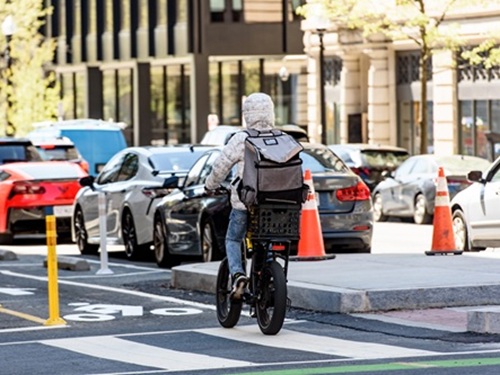Pennsylvania Governor Tom Wolf (D) (seen above) recently “reiterated his commitment” to phase out the state’s fuel tax – which he said is “becoming an unreliable source for funding” for the states’ transportation network – in favor of “alternative” transportation funding methods.
[Above photo via the Pennsylvania Governor’s Office.]
“Our economy, our communities, and our future rely on a strong transportation system that supports our safety and growth. We have more than $9 billion in annual unmet needs across our state-maintained transportation system alone,” the governor said in a statement.

“At the same time, Pennsylvania is relying too much on outdated, unreliable funding methods, and the federal government hasn’t taken meaningful action in decades,” he added.
To address those issues, Gov. Wolf signed an executive order establishing a 40-member Transportation Revenue Options Commission or TROC, which aims to develop comprehensive funding recommendations for Pennsylvania’s “large and aging” transportation infrastructure – comprised of 40,000 miles of roads and over 25,400 bridges.
“Phasing out the burdensome gas tax, coupled with seeking long-term reliable funding solutions that will keep pace with our infrastructure needs, deserves a close examination,” he noted.

“Forming this bipartisan commission will bring multiple, bipartisan voices to the table to ensure that we can examine reliable, sustainable revenue solutions to address both near-term and long-term funding needs,” the governor said.
On top of that, a recent assessment by the Pennsylvania Department of Transportation indicates the annual gap of its fiscal needs across all modes and facilities could expand from $9.3 billion currently to $14.5 billion by 2030. The agency also continues soliciting public input on potential alternative funding solutions via its PennDOT Pathways Program.

“A safe and reliable transportation network is critical to quality of life for those who travel throughout our state,” explained Yassmin Gramian, PennDOT’s secretary, noted in December 2020.
“We take our responsibility as stewards of mobility very seriously, which is why we must explore our options,” she said.
The agency also noted that as more fuel-efficient cars and alternative propulsion vehicles – such as those powered by electricity – grow in number, relying on fuel tax revenue, which comprises 74 percent of PennDOT’s funding, becomes “less and less dependable” as a transportation funding option.
Gov. Wolf noted that TROC plans to hold its first meeting on March 25 and it is expected to issue a report of its activities and potential transportation funding options by August 1.
 States
States
Washington D.C. Launches E-Bike Food Delivery Pilot
July 18, 2025 States
States

